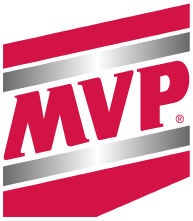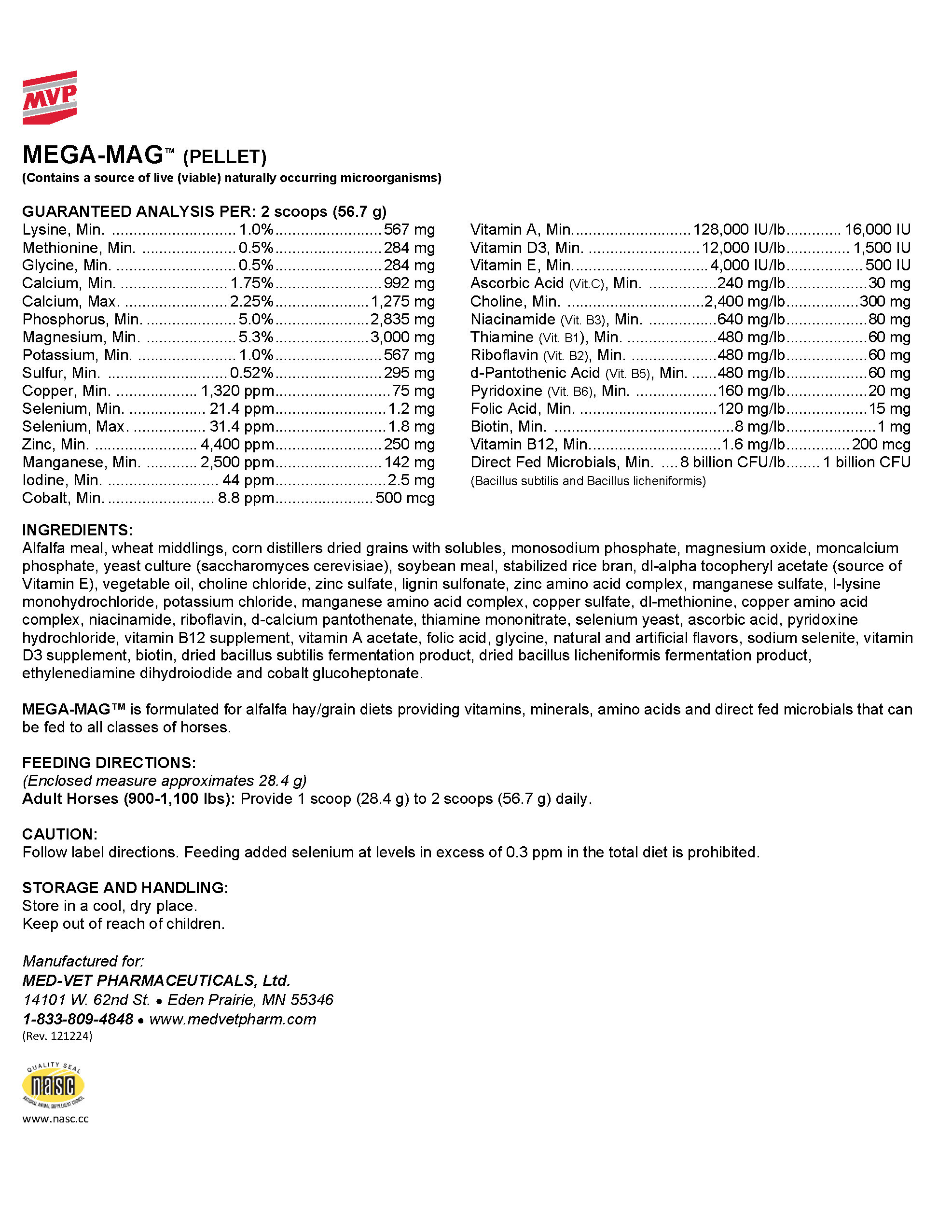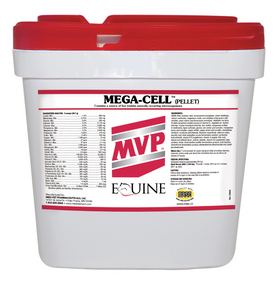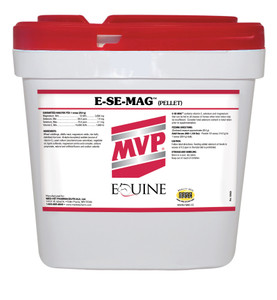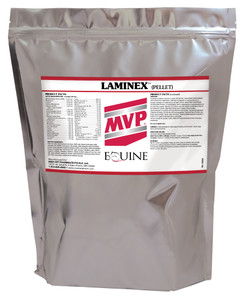Biotin is a member of the B vitamins family and, like some other vitamins, is a coenzyme for several metabolic pathways. It is involved in glucose metabolism, growth and utilization of niacin. Biotin helps aid in the growth of strong, healthy hooves due to its role in collagen formation. A number of research studies show that long-term, daily supplementation of 10-30 mg of biotin daily may help improve growth rate and hardness of hooves, especially in horses with less than optimum quality hoof horn (soft, brittle, chipped).
Calcium is a micromineral found in highest amounts in bone and teeth. However, it also has important roles in supporting muscle contraction, cell membranes, blood clotting, enzymes regulation, and hormone release. Absorption of calcium from the small intestine is controlled by vitamin D but can be reduced if there is too much phosphorus in the diet. Ideally, horses should receive slightly more calcium than phosphorus – a ratio between 1:1 and 2:1. Pregnant and lactating mares, growing horses, and exercising horses may need more dietary calcium than an adult horse at rest.
Choline is recommended for supporting a healthy nervous system. Choline is a component of acetylcholine, a neurotransmitter. Acetylcholine carries messages between neurons, which enables the brain to communicate with itself and the rest of the body.
Cobalt (Co) is a micromineral used by intestinal microorganisms to produce vitamin B12, which works with iron and copper to form healthy red blood cells.
Copper (Cu) is a micromineral that aids in the production of normal connective tissues including tendons, ligaments, cartilage and bone. As a component of many enzyme systems, it is also involved in making iron available to the body for blood, in producing skin and coat pigments, in proper nerve signaling and in repairing antioxidants.
Iodine is aids in reproduction and normal physiological function in the horse. This is due to the important role that it plays in natural thyroid metabolism and in the synthesis of the thyroid hormones triiodothyronine and thyroxine. These hormones fulfill multiple functions ranging from healthy cell regulation to tissue differentiation and growth.
Glycine is one of the simplest amino acids and is classified as nonessential because it does not need to be supplied in the diet. However, this compact substance plays many essential roles in the body. Glycine makes up 35% of the protein collagen, is a key component in many metabolic reactions, and has a modulating effect on the immune system. It has also been shown to help promote a balanced digestive system
Iodine is aids in reproduction and normal physiological function in the horse. This is due to the important role that it plays in natural thyroid metabolism and in the synthesis of the thyroid hormones triiodothyronine and thyroxine. These hormones fulfill multiple functions ranging from healthy cell regulation to tissue differentiation and growth.
Lysine is an amino acid and the only one for which a requirement in the horse has been established by the NRC and used for the biosynthesis of proteins. This amino acid is often the key to improving protein availability and healthy muscle function.
Magnesium (Mg) is a macro mineral that is frequently recommended for a wide range of equine health conditions. Magnesium helps to maintain normal muscle and nerve function, a healthy heart, healthy immune system and strong bones. Magnesium aids to regulate blood sugar levels, promotes normal blood pressure, and known to be involved in energy metabolism and protein synthesis. Since a symptom of magnesium deficiency is agitation or anxiety, it is included in many calming supplements.
Manganese is a micromineral that aids in bone formation, growth and reproduction. It also supports carbohydrate and fat metabolism. Supplementation should be considered because not all diets provide the same levels of manganese. It plays an important role in young growing horses as well as active performance horses.
Methionine is an amino acid that must be provided in the diet since the body cannot create enough of its own. This means if it is not present in adequate amounts it limits the body's ability to make protein. Methionine can be converted by the body into another sulfur-containing amino acid, cysteine. Because the concentration of both these amino acids is highest in hoof and hair, methionine is often included in hoof health supplements.
Phosphorus is a macromineral that, like Calcium, is found in highest amounts in bone. It is also required for energy production and the synthesis of many vital compounds such as DNA. The minerals calcium (Ca) and phosphorous (P) play a major role in proper growth and development of the skeletal system in horses. Ideally, horses should receive slightly more calcium than phosphorus – a ratio between 1:1 and 2:1.
Potassium (K) is a macromineral commonly referred to as an electrolyte to help support proper muscle function. It helps maintain the body's acid/base balance and hydration status. Muscle weakness, fatigue, and exercise intolerance are likely when potassium deficiency is present.
Potassium (K) is a macromineral commonly referred to as an electrolyte to help support proper muscle function. It helps maintain the body's acid/base balance and hydration status. Muscle weakness, fatigue, and exercise intolerance are likely when potassium deficiency is present.
Probiotics are live microorganisms (bacteria and yeast) that help promote healthy digestive function and support a healthy immune system. Often referred to as ‘good bugs’ they help break down ingredients/contents that the body normally can't, and help inhibit ‘bad bugs’ from growing.
Selenium is a trace mineral that along with vitamin E function together to help to protect body tissues from free radical damage that occurs during oxidation (the conversion of feedstuffs into energy). While some parts of the country have high levels of selenium in their soil and therefore the plants that grow there, selenium deficiency is not uncommon and reported in many states. Therefore, most horses may require supplementation to meet the NRC requirement of 1-3 mg/day, depending on activity level. *NRC upper safe limit approx. 20 mg/day in total diet.
Sulfur is a macromineral found in certain amino acids (methionine and cysteine), as well as the B vitamins biotin and thiamin and a number of other important molecules such as insulin, taurine, and chondroitin sulfate. Sulfur serves major structure and function roles in the body and is a component of proteins such as enzymes and connective tissue such as hooves, bones, cartilage, tendons and ligaments.
Thiamine (Vitamin B1) plays a role in supporting carbohydrate metabolism and normal muscle and nerve function. Thiamine supplementation has been shown to have a calming effect in horses displaying anxious/nervous behavior as a result thiamine deficiency and/or increased requirements.
The Vitamin B family is made up of several compounds that support many important roles in the body: protein, fat and carbohydrate metabolism; energy production; proper nerve cell transmission, reproduction, and division (especially rapidly dividing ones such as red blood cells). B vitamins include thiamine (B1), riboflavin (B2), niacin (B3), pantothenic acid (B5), pyridoxine (B6), folic acid (B9), cyanocobalamin (B12), choline, biotin, inositol and others are sometimes referred to as B-vitamins. For most of the B-vitamins, microorganisms in the large intestine make all the horse needs. Only thiamine and riboflavin have NRC dietary requirements. However, research suggests B-vitamin supplementation may be beneficial to horses with little access to fresh pasture and/or during any periods of stress (training, injury, travel, etc.)
Vitamin A is well known for its role in supporting healthy vision, immune function, and skin/coat. However, it is also needed for respiratory health, reproduction, soft tissue and normal skeletal development in young growing horses and exercising horses that are remodeling bone.
Vitamin C (Ascorbic Acid) is an antioxidant that plays a role in helping combat harmful free radicals. Vitamin C is an antioxidant that helps protect the tissues of the body and also important in the production of connective tissues like tendons and ligaments.
Vitamin D (Calciferol) plays an indirect role in bone growth and maintenance by managing the levels of calcium (Ca) in the body. It assists in the absorption of Ca from the intestine, the movement of Ca into and out of bone, and the amount of Ca excreted by the kidneys.
Vitamin E is considered the most important antioxidant and works closely with selenium to protect the body from the oxidative stress of exercise and illness. Found in high amounts in fresh pasture, levels begin to decay the moment pasture is cut for hay. That is why any horse that does not have access to grass, regardless of its activity level or health, would be a candidate for vitamin E supplementation. Horses are not very efficient in storing vitamin E and deficiency may be accelerated if the diet is deficient in selenium
Zinc (Zn) is a micromineral involved in over 100 enzyme systems ranging from support of connective tissue formation and antioxidants to carbohydrate metabolism and immune system function. It is most recognized for its role in healthy skin and hooves.
